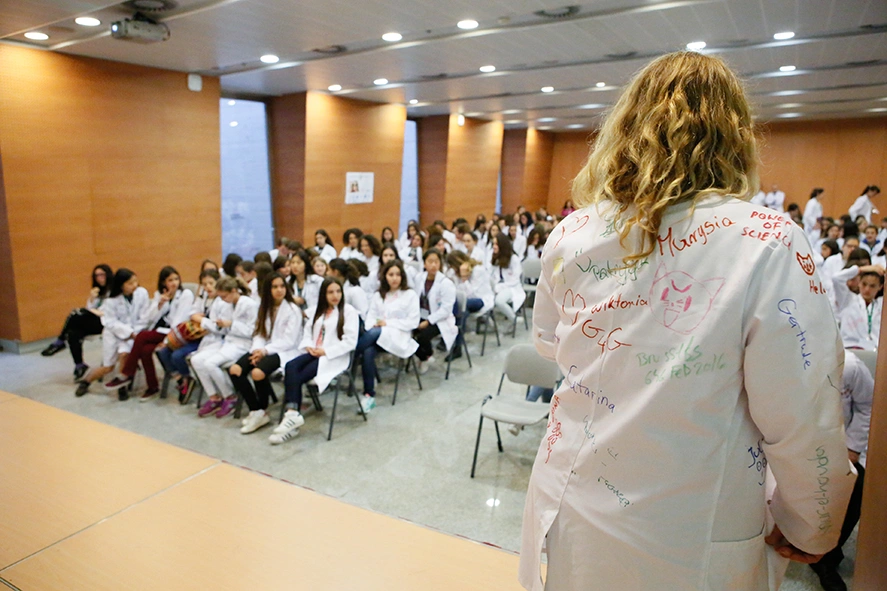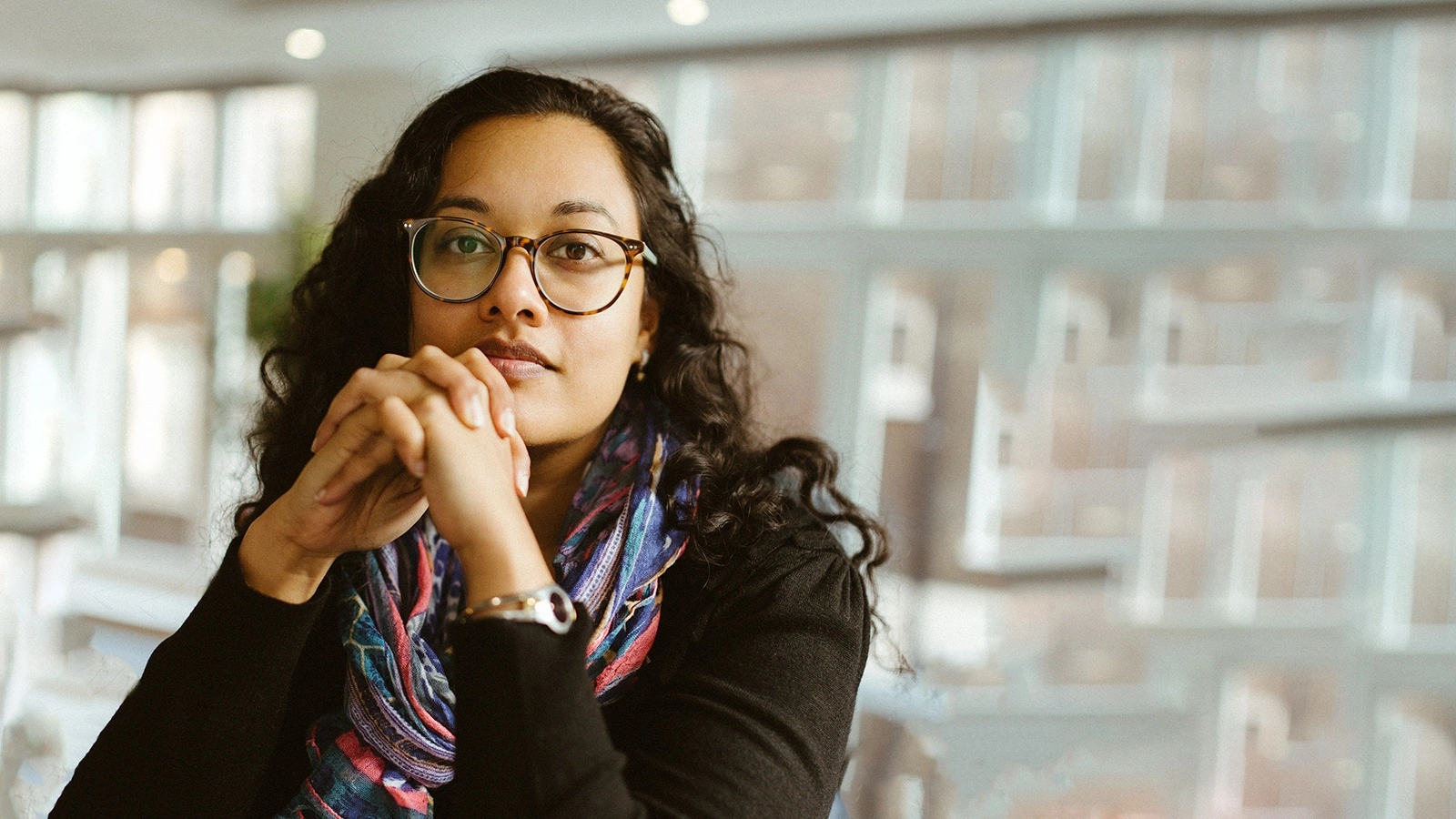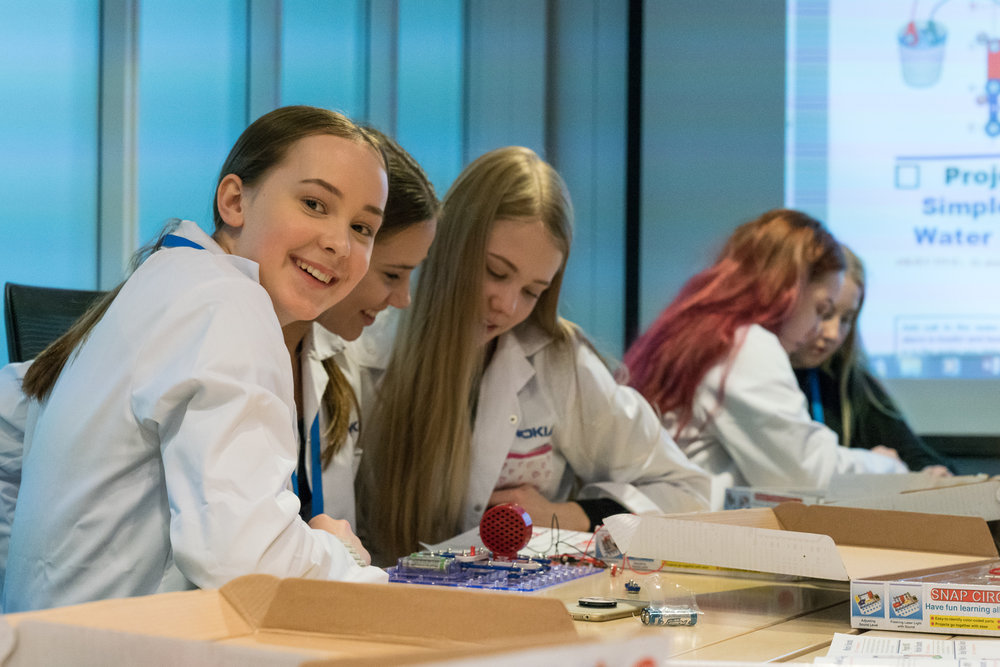Although girls outperform boys when it comes to STEM subject exams, the number of women studying them continues to drop. To counter bias in hiring process and public perception, find out how two women are leading the charge to get more women (and girls) into science, technology and maths.
Dressed in lab coats customised with their own colourful doodles, the crowd of secondary school girls certainly look like budding young scientists.
They are gathered in Luxembourg to take part in a two-day science and technology workshop, and organiser Melissa Rancourt knows it’s important they get “into that persona, whatever that might mean for them.”
Over the next two days, Ms Ranourt’s not-for-profit organisation, Greenlight for Girls, hopes to empower attendees not just to dress the part, but to feel it, too.
From learning about cyber security, to uncovering the secrets of coding, a range of interactive group activities are designed to showcase the wide-ranging appeal of science, technology, engineering and mathematics (STEM).
Alongside that, industry role models – including female members of the Vodafone Luxembourg team – are on hand to share their own experiences and offer mentoring support.
Lead by example
An engineer by trade, Ms Rancourt has grown used to being the only woman in the room.
But when she discovered that the numbers of women in subjects like computing were actually declining, she founded Greenlight for Girls in a fit of frustration.
“It was shocking to sit down and think many years have gone by and it’s still the same,” she says.
“A lot of my experience shaped what I wanted to change for the future.”
Ms Rancourt’s goal is simple: encourage more girls to pursue STEM-related disciplines. Despite booming employment opportunities in these sectors, women remain woefully under-represented.
In 1984, 34% of computer science majors in the US were women; by 2016, it had dropped to 18%. It’s a similar story in the European Union, where the number of women enrolling in STEM-related subjects continues to plummet.
Greenlight for Girls’ signature event, g4g Day, offers a blend of practical support and hands-on inspiration for girls aged between 11- 15.
“It’s a time filled with changes and decision, but also filled with school systems and a society that tends to put people into boxes about whether they’re good at STEM.”

Greenlight for Girls Day at Vodafone Luxembourg. Picture credit: Greenlight for Girls
Mind the gap
Since the organisation’s launch in 2010, it has reached 31,000 students across six continents.
From the rural hills of Brazil to the tech-obsessed realm of Silicon Valley, Ms Rancourt has been surprised to discover it’s the same story everywhere they go – girls urgently need to have their confidence bolstered when it comes to STEM subjects.
Research into the industry’s gender gap reinforces her observations.
While 60% of teenage boys cited a STEM subject as their best, only 33% of girls did the same, despite the fact they regularly outperform male counterparts in exams.
According to Greenlight for Girls’ own studies, girls also believe that society sees boys as better in STEM fields.
It’s a perception supported by the fact that men are twice as likely than women to be hired for a job in mathematics simply because of their gender.
While the STEM sectors offer lucrative careers, women are still excluded from them. The UK’s digital sector alone is estimated to be worth £130 billion, with tech workers in London earning 60% more than the city average in 2016.
Yet in 2018, female programmers and software developer made up only 4.2% of the tech and telco professionals.

Amali de Alwis, former CEO of Code First: Girls. Picture credit: Amali de Alwis
Opening the door
Amali de Alwis, former CEO of award-winning social enterprise Code First: Girls, is determined to see more women benefit from this boom.
Over the course of her 20-year career, she saw female colleagues missing out on opportunities simply because the sector felt inaccessible to them. All they needed were the digital tools to navigate it with greater confidence.
“We now live in a society where tech is the foundation of everything, and it irked me that we don’t have more women involved in creating those products and services and actually taking advantage of the amazing opportunities that exist within really exciting companies,” she says.
At Code First, they’ve launched a campaign to deliver free coding education to 20,000 women in the UK by 2020.
In addition to free community courses offered to young women, they run paid courses for professional women and corporate training for companies that want to increase their employees’ tech literacy.
To date, £6.75 million worth of free coding education has been delivered to more than 10,000 young women.
Through their partnership with Vodafone alone, 2900 girls have completed the programme to date.
One young woman became a software developer for BT after taking their course. Another now speaks on industry panels.
“These are the kinds of stories where you hear what an impact just a little bit of training, a little bit of support, and being able to tap people into a community of individuals who are going on the same journey has,” says Ms de Alwis.
It’s not simply the economic side that de Alwis worries women are missing out on. Should the status quo remain, she warns of “a society which basically isn’t fit for purpose.”
Products that are created by men will continue to overlook the needs of women, from Google’s speech recognition bias towards male voices, to the fact that women are 47% more likely to be seriously injured in a serious car crash because cars are designed to accommodate male crash dummies.
Tech has quickly become responsible for shaping “life infrastructure.” The continued shortage of women in the industry will have a significant – and sometimes life-threatening – impact on the world that is developing around them.
As Greenlight for Girls’ g4g events draw to a close, a ritual has developed. The girls are gathered together to yell en masse, “Anything is possible!”
The reason is simple.
“It’s important to say it and it’s important for them to hear it,” says Ms Rancourt.

























